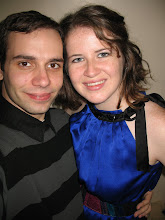I shall not apologize for my reprehensible neglect of this blog. I've got work to do, and I'm sure you didn't really mind the hiatus! However now that not only my nose but also my mouth are above the proverbial water, I'll take the time to explore an idea that occurred to me last night as I read about facial attractiveness.
I'm researching a paper on the methodology used in studies investigating what makes a face attractive. To do said research, I'm reading a bunch of studies to critique their methodology. One article described the Multiple Fitness Model whereby female facial attractiveness is based on a combination of three types of features:
-neonate: large wide-set eyes, small nose, small chin
-mature: prominent cheekbones and narrow cheeks
-expressive: high eyebrows, large pupils, large smile

Being the girl that I am, I couldn't help but see if I had a facial feature from each category. Well, nothing out of neonate... or mature... possibly a large smile? Of course I haven't run the quantifying program on my face that the researchers use, but let's be real, you can make an ad-hoc judgment on each of those criteria.
My point (and no, it's not to wallow in self-pity!) is that it made me wonder if we need to know everything we now know. Did I need to know exactly why I'm not model-quality pretty? I could have gone on happily thinking that while not the ideal, I had aspects of beauty, before the Multiple Fitness Model quite thoroughly proved otherwise. (I'm operating under the assumption the MFM is correct in all its assumptions and effects, which of course it isn't, but go with me on this.)
Before humans had all the scientific knowledge they have, creation myths and just-so stories took their place in the realm of explanations. Why do elephants have trunks? Well one day a hippo sat on an elephant's nose and as he struggled to free himself, the elephant stretched out his trunk until it is the length we see it today. Why do women have pain during childbirth? Eve gave Adam the apple. Those events that cannot be explained are either given creative origins, or are simply wondered at. As each mystifying element of our environment is explained scientifically, we lose a bit of the magic of the universe. The awe and wonder of not knowing is replaced by the empirical knowledge that elephants evolved a long trunk to use as a sort of hand and to reach leaves and other foodstuffs; that women experience pain giving childbirth well, because they're forcing a rather large object through a rather small opening.
Of course, being a (light) scientist, I can't go too far down this train of thought before rejecting all the romance of naivete for its reality: knowledge and learning are the basis for human development. We couldn't have progressed to the point we have without being able to create scientific knowledge and learn. More importantly (and more applicable to today's society) knowledge is the only defense we have against prejudice via ignorance. I'm specifically thinking about how science is working towards nullifying the ill-informed ideas regarding peoples of different races and sexual orientations. Systematically, science is showing that there is no significant biological difference between races (more variation within a group than between groups) and is exploring the biological basis for homosexuality and bisexuality (rather than letting people continue to think it's a choice).
As long as people remain ignorant, they create stories to explain observed phenomenon: That man is less intelligent because he's black, Homosexuals choose to be gay to be different and get attention. And those stories are not romantic and entertaining. They're damaging to humanity. So, Go, Science, Go! and let us all be sure to disseminate true knowledge. That's the only way we can combat myths.
Oh, and is the knowledge of how things actually work any less mystifying? Consider the human body. We've got a pretty good grasp on how it works. Does that mean it's any less amazing that mitochondria help create energy? Why do they do that?! Those little things in my tiny cells power my body?! Surely the intricacies of the universe are still wonderful even as we understand them better and better. So while we may no longer be innocents, we can still find awe in everything around us.



